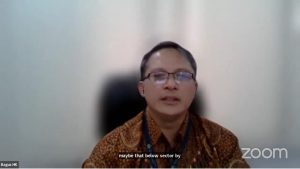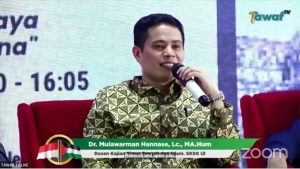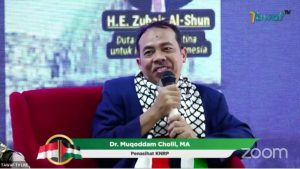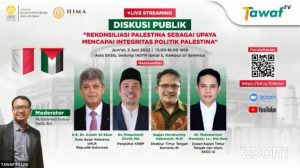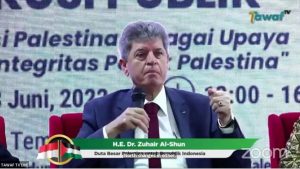
The School of Strategic and Global Studies (SKSG), Universitas Indonesia, held an open discussion that presents as one of its chief participants the Palestinian Ambassador for the Republic of Indonesia (RI), His Excellency Zuhair al-Shun. The open discussion organised by Middle Eastern adn Islamic Studies discussed the conflicts unfolding in Palestine. Titled “Palestinian reconciliation as an attempt towards Palestinian political integrity”, the event discussed the conflicts’ background, the carving up and acquisition of Palestinian territory by Israel, and attempts that have been taken towards peace.
The event is held on Friday (3/6) in IASTH Building’s Hall, UI’s Salemba Campus, and broadcast online through Zoom and Youtube. Also present in the event are the Advisor of the National Commitee for the Palestinian People (Komite Nasional untuk Rakyat Palestina / KNRP), Dr. Muqoddam Cholil, MA; the Indonesian Ministry of Foreign Affairs Director of the Middle East, Bagus Hendrning Kobarsyih, M.Si.; and a lecturer from Middle Eastern and Islamic Studies SKSG UI, Dr. Mulawarman Hannase, Lc., MA.Hum.
One of the contributors, Dr. Mulawarman Hannase, stated that reconciliation attempts to restore amicable relations between parties in conflict with each other. Palestinian reconciliation is a globally-significant issue because it encompasses the interests of various parties, including Israel, Arab countries, and the State of Palestine internally. Indonesia, whose relations with Palestine extends well into the distant past— Palestine being one of the early backers of Indonesian independence— wholly supports efforts towards the freedom of Palestine from all sorts of colonialism and occupation. Indonesia has played several roles and contributed aid towards the independence of Palestine amidst internal and external dynamics.
The next speaker, Dr. Muqaddam Cholil, discussed strategies employed by Indonesia in its support of Palestine. He expounded four of such strategies of support, namely political support towards Palestinian independence, support for Palestinian self-sufficiency, diplomatic support in the form of humanitarian aid, and synergic ties between the government, private sector, and people in Indonesia [in order to affect such support]. Indonesia delivers aid to Palestine via two processes dubbed Government to Government (G2G) and People to People (P2P). G2G is the distribution of aid by the Indonesian government through the Palestinian government, while P2P are acts of private fundraising targeted towards those the government might not be able to reach.
“One of the programmes that Indonesia has carried out in an effort to aid Palestine is the donation of parcels in certain months, for instance Ramadan parcels. Donation in the form of clothing to fulfill the needs of the Palestinian people has also been performed. In addition the construction of public facilities such as hospitals has been completed by the government of Indonesia.” says Dr. Muqoddam in his exposition.
Palestinian reconciliation certainly requires the support of all parties involved, especially the Arab world, the UN, and civil society. Several talks, part of efforts to achieve peace between Palestine and Israel, have been done, including talks held by the EU, Germany, Egypt, France, Jordan, and UN Quartet in February 2020 in Germany, July and September 2020 in Amman, January 2021 in Cairo, March 2021 in Paris, November 2021 in Oslo, and 19 February 2022 in Munich. Within Palestine itself, as expressed by Mulawarman Hannase, a lecturer of SKSG UI, efforts must be taken to resolve the internal conflicts that have taken place during the last two decades between Fatah and Hamas. “Currently, Palestine is facing an election, but uncertainty exists as to its execution because big factions are still in conflict. This makes the resolution of conflicts hard to attain.” stated Dr. Muqoddam.
The conference resulted in several points pertaining to the development of the Israel-Palestinian peace process, among those being the discussion of moves to advance processes towards peace in the Middle East, thereby creating an conducive environment by the commencement of Israeli-Palestinian dialogue. The conference has also emphasised a resolution of Israel-Palestinian conflicts based on the two-state solution and urges all parties involved, including the International Quartet and potential partners, to carry out collective effort.
The peace process have yielded positive developments, including the strengthening of international support for Palestine; as demonstrated by Amnesty International and UN Special Rapporteur reports, and a commitment by Joe Biden’s administration to back up Israel-Palestinian peace process. The participation of an Israel Arab political party (the United Arab List) and the resumption of communication between Palestinian and Israeli officials will also support the peace process between the two countries.
For more information refer to:

